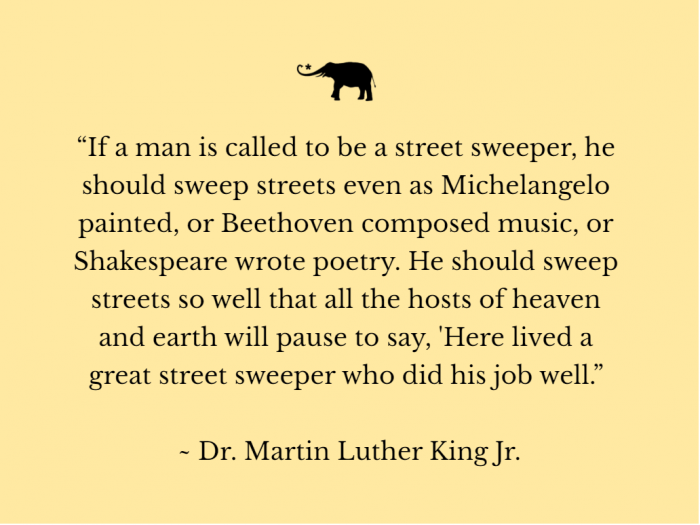Dr. King states:
“If a man is called to be a street sweeper, he should sweep streets even as Michelangelo painted, or Beethoven composed music, or Shakespeare wrote poetry. He should sweep streets so well that all the hosts of heaven and earth will pause to say, ‘Here lived a great street sweeper who did his job well.”
Personally, one of my favorite quotes from this great man, that few have heard, and more should hear. What does it mean? Simply, be proud of a job well done. Whatever the job is that you are doing, always do your best and put forth your best effort.
This life lesson of “always doing your best” is one that needs to be instilled into every child, remembering that we are raising adults, not children.
We have all met a child (and maybe it’s yours) who has little interest or respect for others. They disrespect items in their home or someone else’s home and view helping as an invasion of their time and not of their concern.
They’re the child that turns in illegible homework because they rushed through it and didn’t care. This child puts little effort into any task they’re doing, including a sloppy appearance, acting irresponsible, and blaming everything on someone else. I would be willing to guess that you know a lot of adults like this as well because they were allowed to act that way as a child and were never taught the importance of effort.
Then we have all met the other side of the coin and maybe this is your child. The child that takes an interest in the work they turn in and how it is presented. The child that goes the extra mile when doing a chore or taking on a responsibility. The child that asks for help when they can’t seem to get through something they are struggling with. The child that overall takes pride in their appearance and the way they treat other people.
What is the difference? How did one come out one way and the other way?
The answer is, of course, the way they have been parented. Whether or not a work ethic is being instilled in them, as well as a sense of pride for tasks that they complete and are responsible for.
This often is confused with perfectionism, but it is quite different.
The building of a strong work ethic in your child requires a few things. First and foremost, as a parent, we always want to encourage our child to do their best, since when they do their best, the outcome becomes irrelevant.
If a parent always focuses on the outcome, grades for example and a child gets in trouble when they don’t bring home the required grade, then the parent is not teaching their child to work hard. Instead, they are teaching them that they need to get the best grade in any way they can or they will get in trouble. This may result in a child that is struggling to cheat simply to get a better grade.
Here’s a little fun fact that may make reality a bit clearer to you: the human brain does not fully develop until we are 25 years old.
Right! 25 years old! So, when you look at your young child and say, “They look like they’re playing with half a deck,” guess what, they are pretty much playing with half a deck, especially if they’re a toddler. There is a lot of brain development that goes on between the ages of two and 25, and most of that development is learned, as opposed to something humans are born with.
Why is this important to you?
Because, when you give your child a task to do and you encourage them to do it to the best of their ability, it is important to remember that their abilities are not equal to your abilities. Therefore, if the outcome is not what you expected, consider these things:
>> The age of your child
>> The knowledge they have to complete the task
>> The skills and abilities they have to complete the task
Another key to “always doing your best,” is that doing your best is dependent on how you feel at that moment. Doing your best when you are well-rested, fed, and feeling energized will look a whole lot different than doing your best when you are tired, sick, hungry, or overwhelmed. The same goes for your child.
How can you encourage your child to do their best?
Start focusing on the effort they are putting into a task and not the outcome. Work with them to understand that they need to do schoolwork that can be read and understood by someone else. Remind them to keep a clean work area. Clutter is chaotic and leads to more stress. Putting their supplies, equipment, and toys away in the right place makes these items easy to find if they need them again and keeps an area organized. When you as the parent also focus on the effort that you are putting into a task, as well as keeping areas where you work tidy, you role model what you are trying to encourage your child to do.
When they have done their best and the outcome is not what they had desired, then work with them to analyze what they did originally and discuss together new ways that they can arrive at a different result.
Teach them about Thomas Edison and when he invented the light bulb. He tried 1,000 different ways to create the lightbulb he wanted. When asked how he felt about making 1,000 mistakes, he said that he didn’t make 1,000 mistakes, he simply discovered 1,000 ways not to make a lightbulb. This lesson encourages hard work, persistence, and determination to reach a desired goal.
Be sure not to judge or criticize your child.
When you judge your child or criticize them, you diminish whatever effort they put in. Your child will feel like they should not even try because they obviously cannot do anything right.
An example of this is: your 5-year-old works hard dusting the table in the living room and when he is done and proud of his work, you see a corner un-dusted and say, “Well, you missed a few spots.” That is criticism. What should you have done? You should have said, “What a great job you have done, thank you so much for helping out. I really appreciate it.” Then, after your child has gone to bed or is out of the room (the key here is not redoing it in front of him), you can then touch up the spots that he missed. As he gets older, he will do better and better and always try harder and harder.
Give your child responsibilities in the home. Let them help you cook and assist with other tasks. Give them the time and opportunity to get better and better at their skills. Don’t do everything for them—give them a chance to learn.
Most importantly, if you are watching them work diligently to complete a task, let them know how proud you are of them for the effort they are putting in and ask them how they feel as well. When you let kids know how proud you are of them, they become proud of themselves. Celebrate the journey, not the outcome and a strong work ethic will be built.
~











Read 5 comments and reply